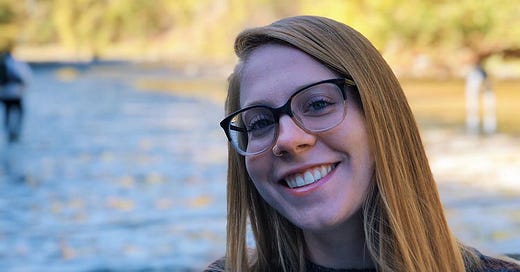With Queer Food Foundation, This Brooklyn Activist Advocates for LGBTQ+ Hospitality Workers

Gabrielle Lenart launched Queer Kitchen in 2018 in an effort to offer LGBTQ+ hospitality workers a platform where they could feel safe and fully accepted. The group held workshops, networking events, dinners and even “drag” shows to engage its members, but as it evolved, Lenart wanted to do more.
The Brooklyn-based industry vet decided to change the direction of her business model by turning it into Queer Food Foundation, a nonprofit organization. “We decided to move to the nonprofit sector, just so we could meet the needs of the LGBTQ+ community,” Lenart tells me during a recent Zoom conference interview. “We really wanted to focus on grassroots issues and provide workshops for individuals who are queer and in the food scene, whether that would be line cook workshops or mutual aid fund documents or professional networking groups and industry focus.”
Lenart had been working on the new model for the past several months during the pandemic and re-launched in early August. Now, she says, part of the mission is to “honor and celebrate queer food workers and chefs to make food more equitable and diverse.” For now, all events will be virtual.
Lenart continues, saying that there’s not centralized space for queer food and her organization addresses that issue. She also doesn’t believe queer food industry issues have been properly addressed in the media.
That’s why she’s tirelessly assembling founding board members from all over the country. And look for it—and the organization—to be comprised of individuals who work beyond the kitchens and bars of restaurants. She wants to get people involved who are in food activism or work at food pantries because those voices are essential.
“I think we need to make room for all those voices to have a chance to share what they think is going on [in the industry],” Lenart adds. “We cannot service the needs of specific communities unless we know what’s going on.”
Transphobic issues, which have been amplified in recent years, will be addressed. During her time working at various restaurants, she witnessed several incidents; she wants the Queer Food Foundation to serve as a safe haven for the trans community.
“I feel like it’s mostly microaggressions that build up into [transgendered people feeling uncomfortable at work],” she says. “For example, mis-gendering someone might not seem that big a deal, but if they get mis-gendered on a daily basis, 10 to 12 times, by the end of the day, they’re fed up with it.
“They’re trying to not only embrace themselves and their identity, but also do this job on top of it. I think there needs to be education and training. I also don’t believe a lot of restaurants have [human resources departments], and so I think that it will be really interesting to see if this is something that is implemented, and if so, is there going to be full training for the staff and/or resources who identify as LGBTQI+.”
There are so many additional initiatives she wants to implement with Queer Food Foundation, including partnering with restaurants (especially those without human resources departments), fundraisers, and mental health relief.
“I think the entire premise of my life’s work was to provide a support system for queer people,” Lenart adds. “I think it goes back to when you’re queer, you inherit your chosen family. … I think just being queer in this climate is just a really daunting task, so I think that just being able to understand that there are people who are just like them out there, and there are people who have similar interests. Us as a collective and a non-profit, we are going to be able to be visible as representation matters for this sort of work.”



